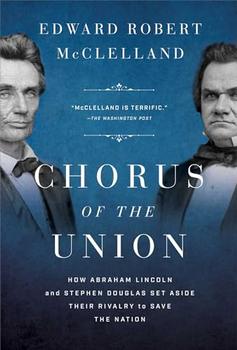
How Abraham Lincoln and Stephen Douglas Set Aside Their Rivalry to Save the Nation
by Edward Robert McClelland
An impassioned and timely exploration of Abraham Lincoln's long-time rivalry—and eventual alliance—with Stephen Douglas.
Abraham Lincoln and Stephen Douglas are a misunderstood duo. History remembers them as antagonists, and for most of the years the two men knew each other, they were. In the 1830s, they debated politics around the stove in the back of Joshua Speed's store in Springfield, Illinois. In the 1850s, they disagreed over the Kansas-Nebraska Act and debated slavery as opponents for a Senate seat. In 1860, they both ran for president.
Lincoln and Douglas ended as allies, though, against the greatest threat—slavery—that our country has ever faced. When Douglas realized he was going to lose the 1860 election, he stopped campaigning for himself and went South to persuade the slave states to accept Lincoln as president. After that effort failed, and the newly formed Confederate States of America bombed Fort Sumter, Douglas met with Lincoln to discuss raising an army.
The story of how Lincoln and Douglas put aside their rivalry to work together for the preservation of the Union has important lessons for our time. We have just been through a presidential election where the loser refused to concede defeat, with violent consequences. Not only did Douglas accept his loss, he spent the final days of his campaign barnstorming the country to build support for his opponent's impending victory, setting aside his long-held desire for the presidency for the higher principle of national unity.
Also, by focusing on the importance of Illinois to Lincoln's political development, Chorus of the Union will challenge the notion that he was an indispensable "great man." Lincoln was the right person to lead the country through the Civil War, but he became president because he was from the right place. Living in Illinois provided Lincoln the opportunity to confront Douglas over the Kansas-Nebraska Act. The debates with Douglas during the 1858 Senate campaign brought him the fame and prestige to contend for the Republican presidential nomination in 1860. Lincoln's moderate views on slavery, which he developed in the swing region of a swing state, made him the ideal candidate for an election that had sweeping historical consequences.
"McClelland, author of Young Mr. Obama and Nothin' But Blue Skies, offers detailed and nuanced context to perhaps the most compelling and consequential rivalry in U.S. political history, which culminated in an alliance for a higher purpose...An excellent combination of history and biography with relevance to today's political climate." —Kirkus Reviews (starred review)
"The political rivalry between Abraham Lincoln and Stephen Douglas fades away as the Union's future grows uncertain in this insightful account from historian McClelland. The book's great strength is its revealing portrait of Douglas, whose maddening contradictions and 'both sides-isms' made him enemies in every quarter, including among fellow Democrats. Artfully blending biography and history, McClelland gives the 'Little Giant' his due as a unifier. It's a wise examination of America's divisive antebellum politics." ―Publishers Weekly
"In this highly readable study of the relationship between Abraham Lincoln and Stephen A. Douglas, McClelland offers the reader an absorbing and compelling story of how two long-time rivals put aside their profound political differences in order to preserve the Union. Eloquently written and thought-provoking, Chorus of the Union sheds new light on a rivalry that has long been misunderstood. This splendid book will become a classic source for understanding these two complicated men." ―Thomas A. Horrocks, author of Lincoln's Campaign Biographies
"A captivating and important new book on Douglas's relationship with Lincoln, from their 1858 debates to Douglas's death two months after Fort Sumter. Beautifully conceived and deeply researched, it is also a sheer pleasure to read." ―Professor John Stuaffer, Harvard University
This information about Chorus of the Union was first featured
in "The BookBrowse Review" - BookBrowse's membership magazine, and in our weekly "Publishing This Week" newsletter. Publication information is for the USA, and (unless stated otherwise) represents the first print edition. The reviews are necessarily limited to those that were available to us ahead of publication. If you are the publisher or author and feel that they do not properly reflect the range of media opinion now available, send us a message with the mainstream reviews that you would like to see added.
Any "Author Information" displayed below reflects the author's biography at the time this particular book was published.
Edward Robert McClelland is the author of Young Mr. Obama, about the president's early years in Chicago, Nothin' But Blue Skies, a cultural history of the Rust Belt, and most recently, Midnight In Vehicle City, about the pivotal Flint Sit-Down Strike of 1936. McClelland's work has appeared in the Chicago Reader, the Chicago Tribune, Salon, the New York Times, and a recent piece on the importance of the Stephen Douglas concession was published (on January 6th) in the Washington Post. Edward lives in Chicago.
Beliefs are what divide people. Doubt unites them
Click Here to find out who said this, as well as discovering other famous literary quotes!
Your guide toexceptional books
BookBrowse seeks out and recommends the best in contemporary fiction and nonfiction—books that not only engage and entertain but also deepen our understanding of ourselves and the world around us.